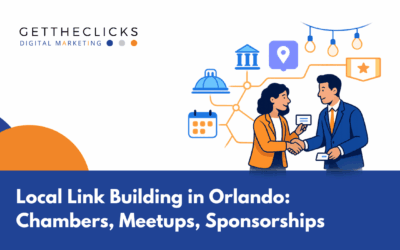When it comes to gaining online visibility, SEO is one of the best ways to generate organic traffic. Having a business website that’s been well optimized can be as important as having a website that’s easy to navigate and aesthetically pleasing.
While the basics of SEO can seem simple, it takes experience to know how to apply the right tactics. It’s not just about stringing together a list of keywords and calling it an SEO strategy. There’s certainly more work and planning involved, which is why businesses turn to Orlando SEO services for help.
Here’s how to get started.
1. Keyword Research is Vital
Keywords play a vital role in SEO, so you’ll want to determine which ones you’ll use through extensive keyword research. Your entire SEO strategy will be built with your keywords in mind, so make sure that you have a good selection and that you do proper research around them.
When you’re first starting your keyword research, take advantage of the Google Suggest feature by typing a word in the search bar and seeing what Google recommends. This will show you what people are searching for and can help you plan a keyword strategy.
One thing to keep in mind when it comes to keyword research is the length of keywords. Short-tail keywords are only one or two words. When using these keywords, you’ll have a high level of competition with a fairly low conversion rate. Don’t be misled by their higher search volume as it won’t translate into traffic or sales anyway if you fail to rank well due to the higher competition.
On the other hand, long tail keywords aren’t as competitive and tend to have a higher conversion rate, even if they often have lower search volume.
It’s also vital to understand search intent behind various keywords. For example, someone searching for “how to operate my microwave” is simply looking for information. On the other hand, someone searching for “best microwave to buy for a small kitchen” is often ready to make a purchase. You can say that such keywords have buyer intent.
Ensure that you’re targeting the right types of long tail keywords with the right search intent.
2. Set Goals
Setting goals is the best way to help you track how effective and how well your SEO strategy is working on the search engines. However, to be the most efficient, you’ll have to come up with your goals before you launch your SEO campaign.
When you think of what goals you want to meet, it’s easiest to start with one big goal. This can be anything like increasing online sales, growing your market within a specific audience, or driving more organic traffic to your website. Once you have your main overhead goal, you can work on defining it and setting smaller goals to help you reach it.
If you want to increase online sales, you might define which specific products or services you want to focus on. When it comes to growing your market, determine which audience you want to reach and how you’ll measure the growth.
Plan out how you’ll track new traffic. Will you look at your website as a whole or only certain pages?
Goals will help steer your SEO campaign in the right direction. Without them, you might find yourself drifting off course or unsure of how to measure the success of your campaign.
3. Gaining High Authority and Quality Backlinks
Gaining backlinks and link building will significantly improve the authority of your website. Since Google looks at your website’s authority when considering how to rank it, this is an important, yet often overlooked step in Search Engine Optimization.
Earning backlinks and link building shows Google that your website knows what it’s talking about. It shows Google that your business is an authority in your industry. You can improve your brand and earn backlinks by producing high-quality content that drives high-quality traffic to your pages.
If you get lots of low-quality traffic, Google may count that against you and penalize your website since it’s not very useful to readers. All in all, link building is a vital step in any effective SEO strategy and shouldn’t be neglected. Take the time to work out a solid link building plan that can help to boost your current SEO performance.
4. Use Keywords in Your URLs
Using keywords in your URLs is a great way to sneak in a few extra bonus points. Additionally, Google and search engines appreciate clear, readable URLs over those with a bunch of letters and numbers.
Here’s an easy example: If your web page is about mini bluetooth speakers, make sure your URL contains a relevant keyword. Do some research to see which keywords will be the most useful and then write them into a link.
A good URL will look something like this: www.websitename.com/products/bluetooth-speaker
A bad URL (for the same web page) will look like this: www.websitename.com/products/e8Kj89f3
Using keywords in your website URLs helps to improve your website’s relevance as a whole, so Google knows what the page and your website are about.
5. Write Captivating Page Titles
Don’t only create content that’s good but neglect your page titles. Even if you write high-quality content, many people won’t read it in the first place if you don’t have an enticing title that will attract them to click through from the results page on search engines.
Good page titles should make your readers feel like they need the information you’re about to present them. If your readers don’t feel a need for the content or don’t feel that your content is helpful, they won’t stick around long.
6. Improve Your UX/UI
No matter how great your products or how you create content that’s useful, customers won’t want to do business with you if your website doesn’t have a good UX or UI design.
Your UX design should make it easy for customers to interact with your website. If it doesn’t, then it’s time to improve it.
Your UI needs to stay up to date and provide intuitive navigation or your customers will get lost, frustrated, or exit your website. The look and feel of your website is just as important.
You can’t have a high-quality website without routine UX and UI maintenance. Over time, your operating system will be updated and expectations will change. If your website doesn’t meet these new expectations and adjust, customers will feel like your website is out of date or difficult to use.
7. Prepare for Mobile Searches
These days, about 60% of Google searches are done on a mobile device. As time goes on, this number is growing so quickly that Google has started prioritizing websites that are optimized for mobile devices, even when a search is done on a laptop or tablet.
As people are so reliant on mobile devices these days, it’s vital that your website is mobile responsive. Google has been showing preference towards sites that are first optimized for mobile devices.
Optimizing your website for mobile searches isn’t as difficult as you may think. The best mobile websites tend to have a fast page speed and a responsive layout when viewed on a mobile device.
Don’t go so far as to create an entirely different layout for a mobile device. That’s unnecessary and can confuse customers who access your site both on laptops and from their phones.
8. Differentiate Between Local and International SEO
If your business offers both local and international searches, you’re going to have to create different strategies. You can’t very well assume that the keywords you use for local customers will help attract international customers and vice versa. It doesn’t work that way.
Your Google My Business Page should be your focus for local SEO. Make sure all your information is up to date and accessible. This helps local customers that search using the “near me” feature to quickly and easily find your business. Reviews are another key component in local SEO, so make sure you’re getting plenty of positive reviews.
For international Search Engine Optimization, you’ll want to ensure that your website loads quickly in different countries and offers the correct language. Letting Google know which language is used on each page using hreflang tags can further help with international optimization. You can also write your URLs so that they’re also internationally friendly.
Conclusion
Building an SEO strategy takes time and research, but it’s certainly a step that is worth focusing on. After all, search engine algorithms are complicated. If you rush through your strategy, you risk hurting your campaign and starting off on the wrong foot. Fortunately, with some time and work, it’s possible to create a solid and efficient SEO strategy for your business.





